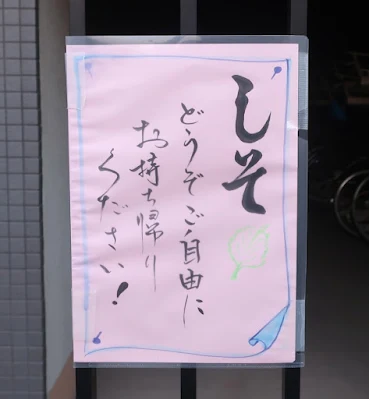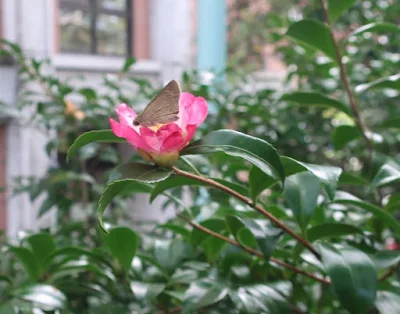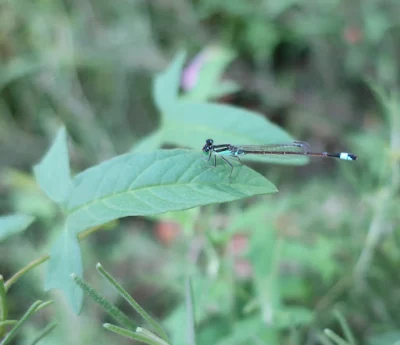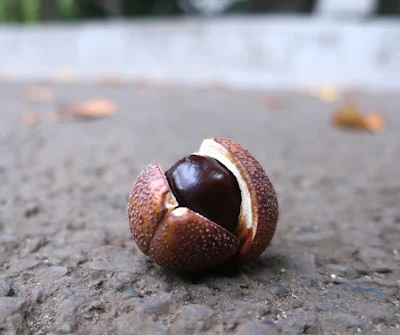A horsefly came to land on a flower of annual fleabane (Erigeron annuus) and started to eat pollen. It was so tiny but a voracious eater😆. I'm not certain but I believe this is a long hoverfly (Sphaerophoria scripta).
Hi! I'm Kei Narujima. This is a blog about flowers/plants🌼and bugs🐛, and sometimes art and unique Japanese culture that make you smile or think (or so I hope)!! こんにちは。花や虫、そして時々日本の文化などについて書いてます😊。税務英語については https://zeimueigo.blogspot.com/ をご覧ください。
Horsefly on an Annual Fleabane (Erigeron Annuus) ヒメジョオン(姫女菀)
英語の後に日本語が続きます。
A horsefly came to land on a flower of annual fleabane (Erigeron annuus) and started to eat pollen. It was so tiny but a voracious eater😆. I'm not certain but I believe this is a long hoverfly (Sphaerophoria scripta).
A horsefly came to land on a flower of annual fleabane (Erigeron annuus) and started to eat pollen. It was so tiny but a voracious eater😆. I'm not certain but I believe this is a long hoverfly (Sphaerophoria scripta).
Shiso (Perilla Frutescens Var. Crispa) シソ(紫蘇)
英語の後に日本語が続きます。
Shiso, a kind of Japanese herb, is very popular, used for various dishes as ingredients (e.g., tempura) and as garnishes (e.g.,somen noodles, sushi, and sashimi ). The paper made me wonder how long it'd been there and why I missed it. I wish I had noticed it a few months earlier and been able to use shiso leaves for somen noodles!!
I always wondered what these tiny white flowers were and found the answer this morning by looking at a piece of paper on the wall (3rd photo), saying "Feel free to take some SHISO!" Yes! These are shiso flowers (Perilla frutescens var. crispa).
Flowering Dogwood (Cornus Florida) ハナミズキ(花水木)
英語の後に日本語が続きます。
Autumn has finally arrived not only on the calendar but in reality in Japan and flowering dogwood trees (Cornus florida) have started to produce fruits with leaves turning red! It's a bit early for the best season for viewing autumn leaves but these are beautiful enough as a starter.
Autumn has finally arrived not only on the calendar but in reality in Japan and flowering dogwood trees (Cornus florida) have started to produce fruits with leaves turning red! It's a bit early for the best season for viewing autumn leaves but these are beautiful enough as a starter.
 |
| Flowering dogwood (Cornus florida) ハナミズキ(花水木) |
Climbing Fig (Ficus Pumila) オオイタビ(大木蓮子)
英語の後に日本語が続きます。
They look like figs but their cuboid shape (3rd photo) differs from usual figs. These are climbing figs (Ficus pumila). Usual figs nearby are all gone when they get ripe while nobody seems to be interested in climbing figs although they're also edible. A woman passing by me said that the fruits were strewn on the ground every autumn. That was on September 8.
Since then, I've been observing the fruits grow and change from green to purple like in the first picture. And something has been bothering me or testing me. The demon inside me whispers to me, "I know you want to try this. No one is watching. Why don't you take one?" The angel inside me tells me, "No one but you is watching, isn't it?" So far the angel has won but who knows what will happen tomorrow? I really really want to have a bite to see what it tastes like. Does it taste the same as a fig does? Climbing figs have been torturing me....
 |
| 2024/10/9 |
 |
| 2024/9/8 |
 |
| 2024/9/8 |
(If you wish to post your comment but don't have a Google account, select "anonymous" from the drop down menu titled "comment as"!)
イチジクによく似てますが、形が違います。オオイタビ(大木蓮子)です。近くに生えているイチジクの実は熟した途端に消えてしまうのですが、オオイタビには誰も興味がないようです。近くを歩いていた女性が、毎年地面に散乱していると教えてくれました。9月8日の出来事です。
それ以来ずっと観察し続け、色も緑から紫へと変わりました。で最近困っているのが、オオイタビの前を通るたびに私の中の悪魔くんが「食べたいんだろ。誰も見ていないよ。取っちまえ」と言う。でも天使ちゃんは「誰も見てなくてもあなたは見てますよね」と言う。ああ、どんな味がするんだろう?イチジクと同じなのか?悶々とした日々が続いているのです。
(Google アカウントを持ってない方は、コメント記入後に「Google アカウント」をクリックし、「匿名」か「名前/URL」を選択してからご記入ください!)
Pink Japanese Stewartia (Stewartia Pseudocamellia) ピンクの夏椿(ナツツバキ)
英語の後に日本語が続きます。
First I was surprised to find these camellia like flowers on the street I walk down every morning and then a common straight swift landing on one of the flowers. These flowers are Japanese stewartia (Stewartia pseudocamellia). As part of its scientific name "pseudocamellia" suggests, the Japanese stewartia is related to camellias and therefore called natsu tsubaki in Japan, which means summer camellia. The camellia is evergreen while the Japanese stewartia is deciduous.
First I was surprised to find these camellia like flowers on the street I walk down every morning and then a common straight swift landing on one of the flowers. These flowers are Japanese stewartia (Stewartia pseudocamellia). As part of its scientific name "pseudocamellia" suggests, the Japanese stewartia is related to camellias and therefore called natsu tsubaki in Japan, which means summer camellia. The camellia is evergreen while the Japanese stewartia is deciduous.
Tahitian Bridal Veil (Gibasis Pellucida) 姫常磐露草(ブライダルベール)
英語の後に日本語が続きます。
I said "Wow." A month ago, they were just like in the second photo and today, I've found them blooming like in the first photo! They're Tahitian bridal veil (Gibasis pellucida). As the name suggests, they're native to Central America and Mexico. The flowers are 1cm in diameter, so tiny and so cute.
I said "Wow." A month ago, they were just like in the second photo and today, I've found them blooming like in the first photo! They're Tahitian bridal veil (Gibasis pellucida). As the name suggests, they're native to Central America and Mexico. The flowers are 1cm in diameter, so tiny and so cute.
Japanese Dogwood (Cornus Kousa) ヤマボウシ(山法師)
英語の後に日本語が続きます。
Fruits of a Japanese dogwood tree (Cornus kousa) in my neighborhood have been changing from green to red. Japanese dogwood fruits are edible but not sold (as fruits) in Japan as far as I know.
The Japanese dogwood is called "evergreen Buddhist monk" in Japanese by comparing the head (or capitulum) of the flower to the head of a monk of the Hieizan (Mt. Hiei) Enryakuji temple and the four bracts surrounding the capitulum to his hood (3rd and 4th photos).
 |
| 2024/10/11 |
 |
| 2024/10/11 |
 |
| 10/2/2024 |
Asian bluetail (Ischnura asiatica) アジアイトトンボ(亜細亜糸蜻蛉)
英語の後に日本語が続きます。
Something makes you always feel happy, doesn't it? One such thing for me is this dragonfly, the Asian bluetail (Ischnura asiatica). The bright blue tip of the tail is so beautiful.
Something makes you always feel happy, doesn't it? One such thing for me is this dragonfly, the Asian bluetail (Ischnura asiatica). The bright blue tip of the tail is so beautiful.
At first, halberd shaped leaves (2nd photo) caught my eye and then the dragonfly on one of the leaves did. The dragonfly is male. Asian bluetails are common in Japan but because of their thinness, you wouldn't be able to find them easily.
Japanese Horse Chestnut (Aesculus Turbinata) トチノキ(栃の木)
英語の後に日本語が続きます。
I thought that they were Japanese chestnuts at first but they have no burs. They're Japanese horse chestnuts (Aesculus turbinata). Japanese horse chestnuts resemble European horse chestnuts and Japanese chestnuts very much but Japanese chestnuts open when ripe whereas the Japanese and European horse chestnuts do not. Also, while Japanese chestnuts are edible and sweet, Japanese horse chestnuts are edible but very bitter and the European ones are poisonous. You cannot mistake one for another...
登録:
コメント (Atom)
Winter Daphne (Daphne Odora) 沈丁花
英語の後に日本語が続きます。 Winter daphne (Daphne odora) is native to China but can be found across Japan. From February to April daphne flowers are so f...

-
英語の後に日本語が続きます。 I read "A Pale View of Hills" by Kazuo Ishiguro a few years ago. The book was my second Ishiguro's book after...
-
Japanese follows English. 英語の後に日本語が続きます。 Is he being boiled to death? (This is a revised version of the story originally posted on Se...

















